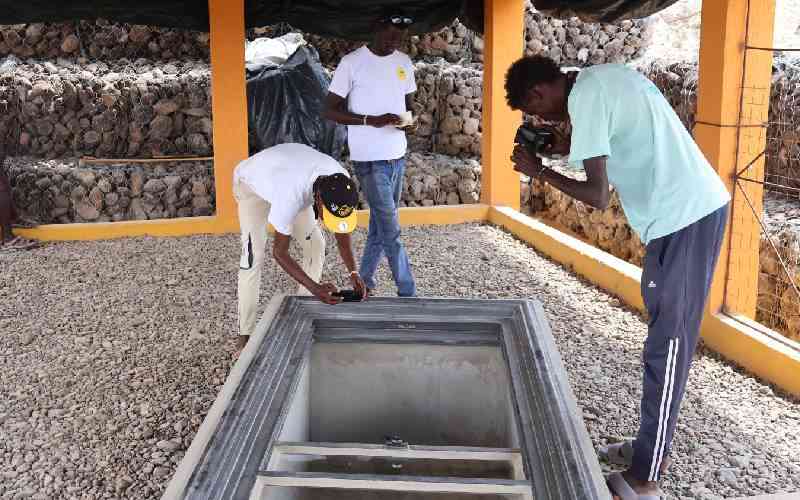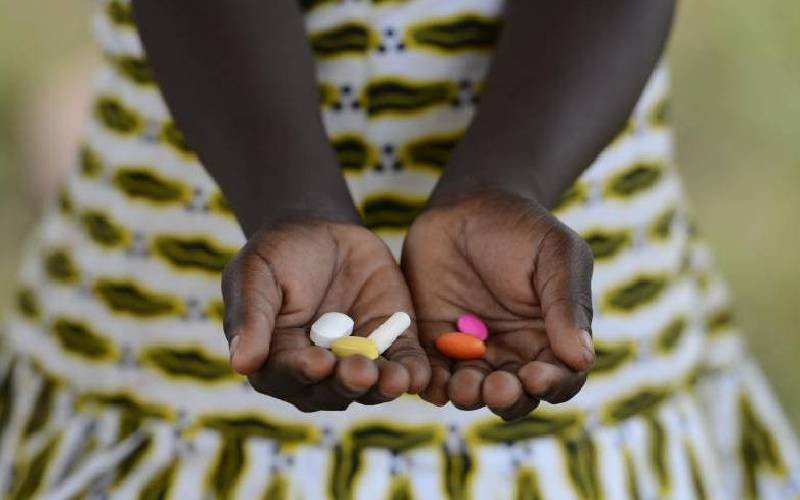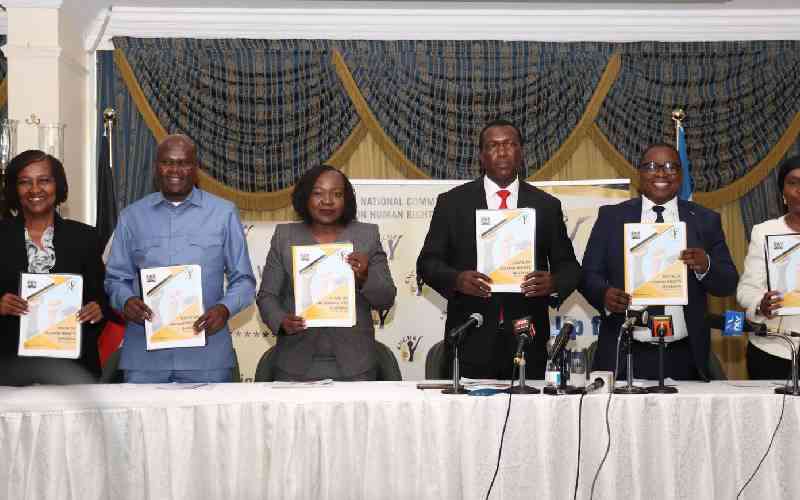
Caregivers are the backbone of society, and no community can stand firmly without their indispensable contributions. Despite their immense value, very little has been done to support their services.
In Kenya, millions of women and men dedicate their lives to caring for children, the elderly, and people with disabilities, often without adequate financial, emotional, or institutional support.
In Nairobi, a quiet revolution in childcare is taking place as community-led daycare centres strive to bridge the gap between parental livelihoods and the safety of their children.
Across the city's informal settlements, caregivers battle limited resources, cramped spaces, and a lack of nutritious food, all while championing the rights of children who are too often overlooked.
These community-based initiatives are not just filling gaps left by inadequate government support; they are rewriting the narrative of childcare and protection in some of Nairobi's most marginalised neighbourhoods.
At the forefront of this movement is Muungano Daycare in Mathare, a centre born out of necessity and community spirit. Founded by Immaculate Thambi Njambi, Muungano Daycare emerged from a self-help group established in 2007.
"We saw a need to start a daycare because most of us couldn't afford house help. We opted to employ one of us to take care of the kids," Immaculate recalls. Today, the daycare caters to 30 children, but the journey has been fraught with challenges.
- Why you must report to police and see a medic after rape
Keep Reading
Operating a daycare in Mathare is far from easy. Space is a constant constraint, affecting the centre's ability to provide a conducive environment for play and rest.
"We are so limited when it comes to space. Kids want to play, others need to sleep, and some are crying. It becomes difficult to manage all at once," Immaculate explains.
Another pressing issue is food insecurity. Most parents pay between Sh 50 and Sh 100 daily, an amount which, according to Immaculate, is insufficient to provide balanced meals.
But the challenges don't end there. Some parents use the daycare as a last resort, leaving their children indefinitely. Others leave for overseas jobs, including in Arabian countries, and never return.
According to the 2022 National Care Needs Assessment, women, especially in rural areas, lack access to basic services such as clean water, electricity, and affordable childcare. This forces them to spend more time on care work, effectively keeping them out of paid employment and educational opportunities. Kenya is not alone in this crisis.
Globally, women do 2.6 times more unpaid care work than men. In Kenya, women perform a staggering 4.6 times more care work than men. If we were to translate the time spent by women on unpaid care work into full-time workdays, the contribution of Kenyan women would be the equivalent of 196 full-time workdays per year compared to just 46 for men. This invisible labour sustains households, businesses, and the broader economy, but remains unvalued.
Similarly, the Impact Research and Development Organisation is tackling another complex issue: the plight of children of key populations, including female sex workers, transgender individuals, and people who inject drugs. These children face stigma and discrimination, often denied services at schools and health facilities due to societal prejudices.
"Children of key populations face a lot of discrimination. In schools and health facilities, they are often denied services or treated unfairly compared to other children," a representative explains. The organisation advocates for their rights, calling for inclusive policies that do not exclude children based on their parents' occupation or lifestyle.
The harsh realities for these children go beyond discrimination. Many are exposed to early sexual activities due to the nature of their parents' work. Others grow up in single-parent households, facing identity crises and social stigma. To address this, the organisation pushes for meaningful engagement in policy-making. "Nothing for us without us. Let us involve key populations when making policies that affect their children," the advocate emphasises.
In Luanda, the fight against gender-based violence (GBV) and child abandonment takes centre stage. A local child activist works tirelessly to rescue abandoned children, often left at her doorstep.
Her work is complicated by the cycle of poverty and social vices that plague informal settlements. She often encounters young mothers who were themselves victims of abuse, perpetuating a cycle of neglect and abandonment.
Amid these challenges, Mathare Care Centre stands as a beacon of hope for children with special needs, including those with Down syndrome, cerebral palsy, and autism. Led by Nelson Otieno, the centre provides specialised care to 52 children, ensuring they receive balanced meals and a safe environment.
For Nelson, the journey has been transformative. Collaborations with other stakeholders have opened his eyes to new ways of running the centre. "I've created partnerships that will enlighten us and improve the standards of services we provide," he says.
The centre grapples with financial constraints despite being a source of hope for the community. Most parents earn minimum wages, making it difficult to afford essentials like diapers and dry food. "It's challenging to ask parents to bring three diapers when some come without food," Nelson explains.
Unpaid care work not only limits women's economic participation but also amplifies the gendered impacts of poverty.
Even more concerning is the fact that the demand for care services is projected to rise dramatically in the coming decades because of Kenya's ageing population. The number of elderly citizens requiring care is expected to grow exponentially after 2025, compounding the childcare crisis that Kenya already faces. Without adequate public investment in care infrastructure, Kenya will face an unsustainable care burden that threatens to stifle economic growth.
Legislation also poses a significant challenge, with registration processes not streamlined for centres dealing with children with special needs. Nelson calls for more empowerment programmes to enhance capacity and create sustainable solutions.
These community-led initiatives highlight a critical gap in Nairobi's childcare ecosystem. They are more than daycare centres; they are safe havens, learning hubs, and support systems for families navigating the complexities of urban poverty.However, without systemic support, their impact is limited. Immaculate's call for inclusive policies echoes throughout Nairobi's informal settlements.
"The government policies don't portray the real picture of people living in the slums. We are not part of the decision-making process," she says.Nelson agrees, emphasising the need for legislative reforms. "The registration process for centres like ours is not streamlined. It's difficult to operate legally and sustainably," he explains.
From Muungano Daycare's quest for space and balanced meals to Mathare Care Centre's fight for legislative support, these organisations are changing lives against all odds. They are redefining community care in Nairobi's informal settlements, driven by resilience, empathy, and a vision for a better future for every child.
Despite the challenges, these leaders remain hopeful. "I believe where someone has entrusted you with their children, you have to take all the measures to protect them," Immaculate asserts.
According to the Kenya Time Use Survey, women in counties like Marsabit spend up to seven hours daily on unpaid care work, double the national average. This highlights the urgent need to finalise and implement Kenya's National Care Policy, especially in underserved areas. Collaborative efforts from the government, civil society, and the private sector are essential to provide accessible, affordable, and quality care services. Public campaigns are also needed to shift gender norms and encourage men to share caregiving responsibilities. Investing in care infrastructure would reduce the burden on women and boost economic growth.
Chyspin Afifu, gender and women economic empowerment specialist at ICRW-Africa said that caregivers-whether paid or unpaid-are the backbone of our society, yet their work remains undervalued, underfunded, and unsupported.
In Kenya, millions of women and men dedicate their lives to caring for children, the elderly, and people with disabilities, often without adequate financial, emotional, or institutional support.
"We are calling for policies that recognise, redistribute, and reduce the burdens of care work-ensuring that caregivers receive the support they deserve. This includes investments in childcare services, parental leave, and financial security for those dedicating their time to caregiving," Afidu added.
Paid and unpaid care workers deserve recognition and fair compensation. The government should establish a legal framework to protect the rights of care workers, including domestic workers, and ensure they receive decent wages and social protections. Care work is real work and should be professionalised. Finally, the government should continue to collect and use time-use data to inform care policies at both national and county levels. The 2021 Kenya Time Use Survey offers a critical foundation for understanding how care work is distributed and should guide future interventions.
Kenya is finalising the Kenya National Care Policy, led by the State Department for Gender and Affirmative Action with support from UN Women and other partners. The policy aims to recognise unpaid care work, reduce its burden, ensure fair wages, and promote gender equity in caregiving. It also seeks to boost public investment in care services like childcare, which has been shown to increase women's workforce participation. However, challenges persist, including limited access to affordable care in rural areas and entrenched gender norms. Addressing the care crisis is crucial for Kenya's economic development and gender equality.
 The Standard Group Plc is a multi-media organization with investments in media
platforms spanning newspaper print
operations, television, radio broadcasting, digital and online services. The
Standard Group is recognized as a
leading multi-media house in Kenya with a key influence in matters of national
and international interest.
The Standard Group Plc is a multi-media organization with investments in media
platforms spanning newspaper print
operations, television, radio broadcasting, digital and online services. The
Standard Group is recognized as a
leading multi-media house in Kenya with a key influence in matters of national
and international interest.











